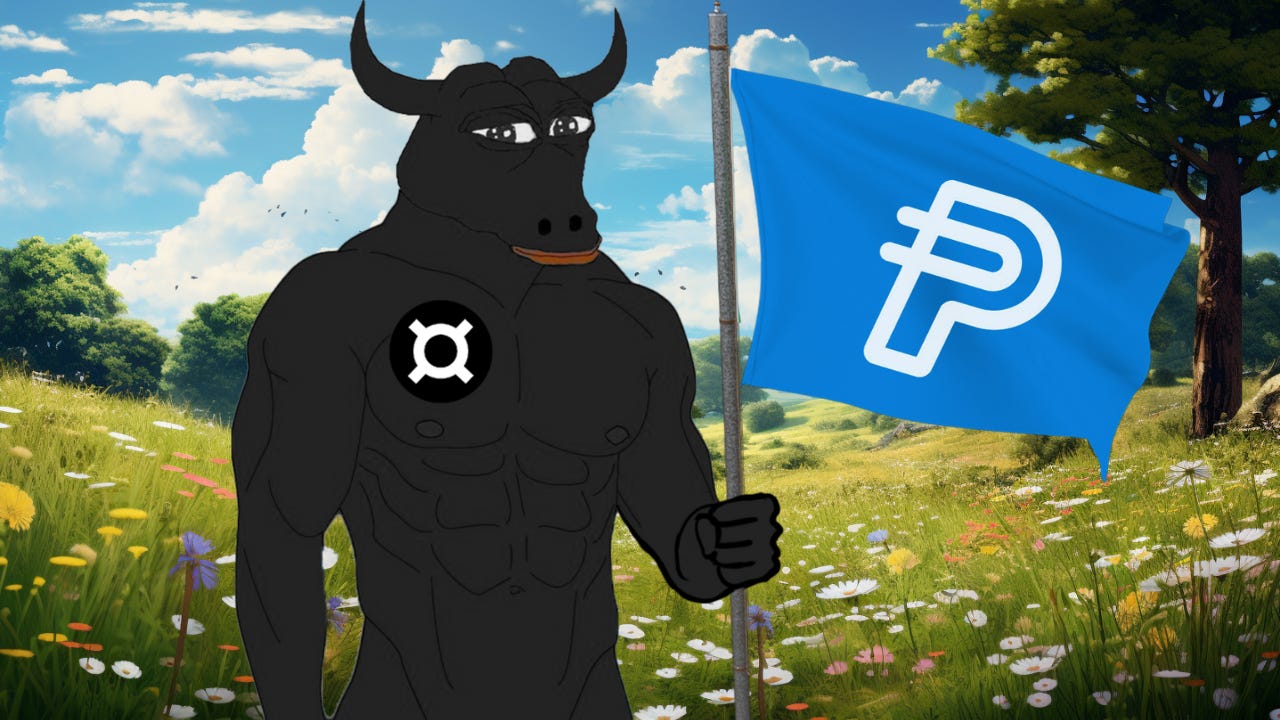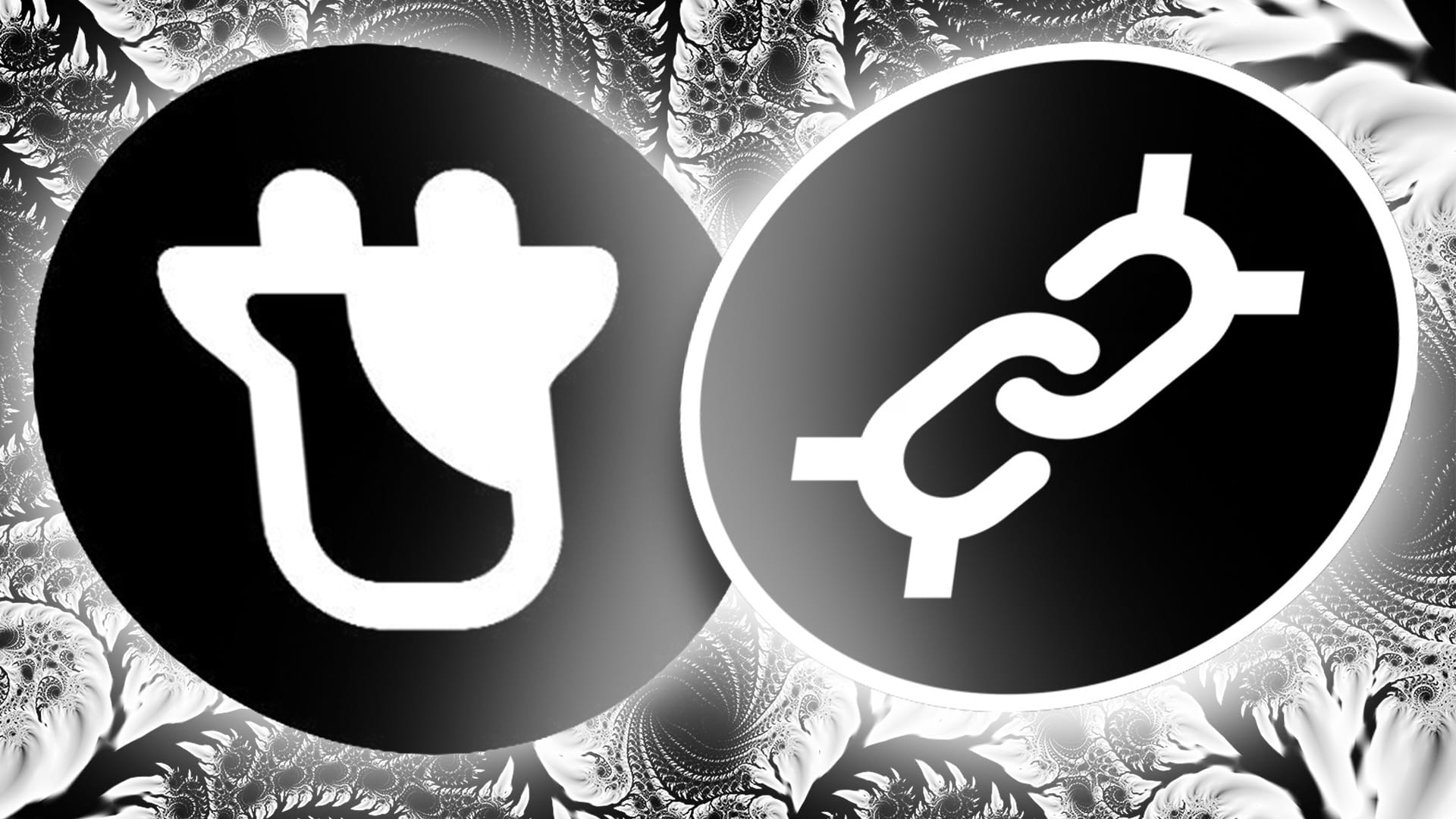On the morning of August 7th, 2023, payment giant Paypal announced the launch of it’s stablecoin PayPal USD (PYUSD). The new stablecoin will be used to connect all 431m of PayPal’s existing user base and ultimately showcase their unabashed commitment to the world on-chain.

What is PYUSD?
Paypal’s PYUSD is the first stablecoin issued by a major “non-crypto” first company. It represents a marked shift in general corporate attitudes towards stablecoins and future beliefs of imminent policy acceptance.
PayPal’s stablecoin PYUSD is fully-backed by U.S. dollar deposits such as short-term U.S. Treasuries, and equivalent assets. Managed by Paxos Trust Company, PYUSD can be exchanged on a 1:1 basis for U.S. dollars through the PayPal or Venmo apps.
According to Paypal’s press release:
PayPal customers who purchase PayPal USD will be able to:
Transfer PayPal USD between PayPal and compatible external wallets
Send person-to-person payments using PYUSD
Fund purchases with PayPal USD by selecting it at checkout
Convert any of PayPal's supported cryptocurrencies to and from PayPal USD
Why Paypal’s Announcement Moves The Needle For Crypto Adoption
Up until now, the only way to acquire payment stablecoins was through a crypto-focused company like Tether, Coinbase, or Gemini. Now with PayPal entering the market, millions of people will now have access to one of the most widely-used payment platforms in the world as a gateway to crypto.
Former Paxos Head of Portfolio Management and Managing Partner at Zero Knowledge Consulting Austin Campbell said on Leviathan News that “One of the most underdeveloped parts of the crypto ecosystem has been the actual on and off ramps.It's hard to do better than PayPal from that perspective. I actually think the biggest innovation here is just adding a native stable coin to the PayPal platform period.”
Campbell further stated that he thinks about “two and half years of work” preceded this product launch. Rumors of PayPal’s stablecoin development had been reported as early as 2021, when Jose Fernandez da Ponte, vice president and general manager of blockchain, crypto and digital currencies at PayPal told the media “This is way too early.” Further rumors were leaked to media confirming PayPal’s plans, but in February this year the payments company announced that it had placed its stablecoin product ambitions on hold while Paxos was investigated by the NYDFS. Six months later, the company apparently felt the regulatory landscape had cooled considerably enough to launch their stablecoin.
PayPal tapped Paxos to manage and issue their stablecoin, which means it will be fully reserved, have segregated funds, and monthly transparency reports. Additionally, their stablecoin will be monitored by on-chain analysis firms like Chainalysis and TRM to monitor for illegal usage. PayPal will be able to freeze funds if they are involved in criminal activities.
Paxos had drawn the ire of regulators for its relationship with Binance after a long string of claimed violations finally resulted in New York Department of Financial Services' order to halt BUSD minting as well as a Wells notice from the Securities and Exchange Commission. NYDFS said that the order was “a result of several unresolved issues related to Paxos’ oversight of its relationship with Binance.”
“Effective February 21, Paxos will cease issuance of new BUSD tokens as directed by and working in close coordination with the New York Department of Financial Services,” Paxos said in a statement, adding that it would “end its relationship with Binance for the branded stablecoin BUSD.”
The market has evolved and the Binance relationship no longer aligns with our current strategic priorities," said Charles Cascarilla, CEO of Paxos.
Binance’s relationship with Paxos allowed them to mint BUSD directly from their exchange and port it to any blockchain of their choice.
“The Department has not authorized Binance-Peg BUSD on any blockchain, and Binance-Peg BUSD is not issued by Paxos,” NYDFS said.

Now that PayPal is working with Paxos, it must signal the investigation has run its course and the embattled issuer is free to operate now after heavily regulatory scrutiny.
PayPal vs Meta
While the announcement still is fresh, reactions to it are markedly different than the failed Diem stablecoin developed by Meta. The social network was lambasted and roasted in front of Congress by politicians, economists, and activists on both sides of the aisle when it first announced its intentions to enter the market in 2021.
Facebook at the time was still reeling from the Cambridge Analytica scandal which had been a flashpoint in the 2020 elections. The company had yet to rehabilitate its image and so reactions to the Diem news were fierce.
Senator Elizabeth Warren voiced her “strongest opposition to Facebook’s revived effort to launch a cryptocurrency and digital wallet.” Additionally, she, Sens. Brian Schatz (D-HI), Sherrod Brown (D-OH), and others wrote in a letter, “Facebook is once again pursuing digital currency plans on an aggressive timeline and has already launched a pilot for a payments infrastructure network, even though these plans are incompatible with the actual financial regulatory landscape — not only for Diem specifically, but also for stablecoins in general.”
The issues for Facebook were two-fold according to Campbell.
First, unlike PayPal, Diem was a brand new business line for the company. Facebook is a social network used by over 2 billion people globally. It also owns the Whatsapp and Instagram brands. The addition of a payments service would have radically transformed Facebook into a giant quasi-bank that could immediately onboard its entire user base overnight. Lawmakers and regulators were scared that Facebook would further abuse its already substantial powers using data collected from its users.
Not only would the social giant have access to your friends list, likes, posts, direct messages and geographic data. The addition of Diem would also potentially grant Facebook unprecedented personal financial access to every one of its users. For a company whose image was already in the gutter due to scandals, Diem was just one step too far.
The second issue with Diem, instead of just being a US dollar stablecoin, the protocol had imagined plans to issue a SDR like currency backed by multiple foreign currency pairs like the Euro, Yen, Aussie dollar, and Swiss Franc. Economist literally shit gold bars (hah) at this proposal. In their minds, global access to a basket of currencies would impair central banks from imposing domestic monetary transmission. If their pawns citizens were able to easily acquire a volatility dampened stablecoin anywhere globally, then what poor sap would buy their worthless bond offerings?
Diem never made it out of regulatory hell. Paypal is shining.
Interest Rates Rule Everything Around Me
In 2023 every major fintech is a quasi-bank that earns a significant portion of their revenue from net interest income. Coinbase, Robinhood, and a host of other companies all are earning outsized profits from rising interest rates.
The prospect of adding a stablecoin to their product offerings is enticing as its similar in design to a zero coupon bond with zero interest. The stablecoin issuer issues the token, yet gets to keep all of the yield earned from short term treasuries. In a perfectly rational world, with a unbridled competitive market, no one would own stablecoins or cash for that matter. What good would it be to own an asset which fails to pass on interest income? Short answer…. nothing.
But we live in a world with gigantic regulatory hurdles, sanctions, FX swap limits, domestic capital controls, and securities laws. Simple access to dollars is plentiful enough for some people. In crypto land, demand for leverage has, up until recently, far outstripped need for importing treasury yields. With short term yields at 5%+ with no signs of cooling, a new paradigm had emerged.
Enter Tether…

Tether is on track to earn 4bn in net interest income this year. This is more than Blackrock will earn. All for issuing dollar denominated debt. It’s a no brainer that every fintech + bank should issue their own stablecoins, it’s literally ‘free’ money for them.
PayPal in theory should be able to outcompete Tether and potentially Circle with its larger user base and wider global onramp footprint. Campbell in our interview thought that the market cap of PYUSD could rise to $500bn in 5-10 years. At that size, PayPal would be one of the largest holders of US treasuries in the world and earn over $25bn gross interest income annually.
Will PayPal Enter the Curve Wars™?
Short answer…No. Longer answer, it depends on the jurisdiction.
In the United States and Europe there are heavy restrictions or outright bans against paying interest income back to the plebs. Gary G himself would go knock on Paypal’s door if they started OTC’ing CRV from Michael to bribe their pool. In Europoor land, new issuers of stablecoins under MiCA (e-money tokens, or EMT) will be prohibited from granting interest in order to “reduce the risk that e-money tokens are used as store of value.” Economics breaks down when the seigniorage governments extract is no longer a function conduit. We talked about this in our recent podcast with Omid Malekan, governments aren’t ready for treasuries to become the defacto means of payment in the world.
Outside of these two continents, a competitive market will drive polities in the Middle East and Asia to attract new holding Co.’s that have one job and one job alone, passing on interest. We’ve already seen this with Zunami Dollar (USZ), a Japanese based stablecoin that’s directly depositing its net interest income into Votium pools to boost Curve liquidity. Campbell thinks PayPal could setup in one of these locales, they are “quite global” and “it's not a requirement that they're necessarily gonna do this out of a US entity either.”

If Michael’s vision is seen through, Curve will become the leading market for Forex. PYUSD would be just one of the thousands of international stablecoin currencies on the market. Traders will demand liquidity and liquidity on Curve necessitates bribes. If PYUSD does achieve scale, it wouldn’t be so outlandish to see a non-US based PayPal subsidiary entering the Curve Wars.
Banks Under Threat 👀
Payment stablecoins in their current form are a threat to the leveraged loan model inherent to banking. After the collapse of Silicon Valley Bank, depositors were forced to reassess the business model underpinning their savings. If a company like PayPal is offering stablecoins available for use in DeFi, what reasons (other than FDIC insurance and a host of regulations) should any funds be kept in a bank at all?
When I swap my dollars for PYUSD, I can check monthly to see the exact amount of all investments and holdings backing my stablecoin. And Paxos only holds cash and short term treasuries. They have no long bond exposure that led to the downfall of SVB.
“If I want to use a debit card, I also am like engaging in commercial real estate lending. Like people don't think of it that way, but when you give your money to a bank, that's what they do with it. They go lend that money out” Campbell said.
With the SEC and Elizabeth Warren doing all they can to hamper bank growth, JP Morgan will be the last institution to get the regulatory sign off to issue stablecoins. Bank deposits are under threat as retail depositors shift their savings out of banks and into DeFi.
Structural changes are imminent if fintech companies are permitted to operate in current fashion. Campbell said “Banks in general, if this model continues to proliferate, and I wanna be clear, I think it should, are gonna face an existential question of what does our funding model look like? What is the real price of borrowing and how should we be structuring this? Because as we discovered in 2008, we've probably been way too biased to just making loans at any cost, and that may be because we're forcing all of the deposits into the system to be lent out in risky fashion, whether people want that or not.
Stable SZN Gaining Massive Momentum
PayPal’s entrance into the market is just the beginning. More major payment and credit companies Visa, Mastercard, and Square have all reportedly been exploring adding stablecoins to their product lines. Today’s announcement will greenlight launch of competitors and speed up development time. PayPal is out the door first, but its competitors will watch intently how the markets and Washington D.C. responds.
If no major objections arise and PayPal’s stablecoin grows, their entrance will be swift and signal a new monetary regime. Congress has yet to pass a unified stablecoin bill and this moment may be the catalyst for forcing D.C. to end its gridlock on the long awaited stablecoin bill. Once clarity is achieved, the “Spring of a Thousand Stablecoins” will commence which will unlock capital efficiency in the world off-chain while flooding liquidity on-chain.




